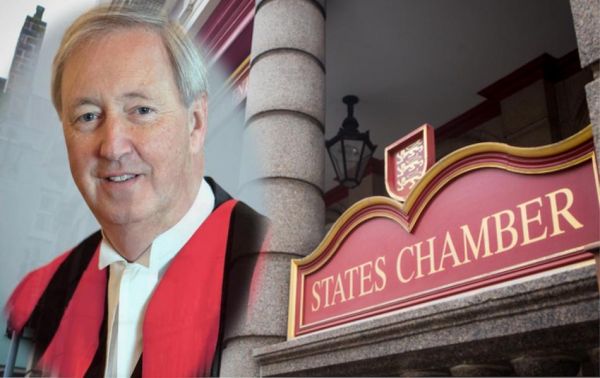

Government proposals that could see defendants who are put on trial and later cleared of wrongdoing left at a financial loss have been blasted by the Bailiff as “unfair”.
The comments by Sir William Bailhache came during a Scrutiny hearing as part of a wider review into potential changes to Jersey’s legal aid system.
Currently, those who have not been found guilty of a crime in the Magistrate’s, Royal or Youth Court are entitled to be compensated for any money spent on legal help.
However, new plans would see them only gain back a fixed sum based on the average rate of a legal aid lawyer – a sum set by the government – leaving some at a financial loss even if they are cleared of all wrongdoing.

Pictured: The Bailiff, Sir William Bailhache.
“Because the fees for the legal aid lawyers, they will be fixed at what the state think they can get away with…When I say ‘get away with’, I do not mean to be derogatory in any sense, it is just as long as you can provide enough lawyers who are prepared to do the work at £180 an hour, why would you pay £250 an hour?” the Bailiff told the Legal Aid Review Panel.
Giving the example of an acquitted defendant having recruited a lawyer at a substantially higher rate of £400, Sir William explained the problem: “I am not sure why it is fair for the state then to say to the acquitted defendant: ‘You are not going to get all your costs back because we only pay this to our public sector legal aid lawyers.’ That seems to me to be unfair and I said to all my colleagues as well. That funding point is quite an important funding point.”
It's not the first time the point has been raised – Advocate Olaf Blakeley expressed strong concerns over the proposed law when the changes were first suggested last year.
“If the Crown accuses you of a crime, presses ahead to prosecute you, turns your life upside down, puts you through the anxiety of a trial, but ultimately the allegations are not believed by the court/jury, then it can only be right your costs and expenses are refunded.
“From my perspective, I cannot see how any other outcome is just,” he said.

Pictured: Under the suggested law changes, defendants could be acquitted of a crime, but not get their full fees back.
One solution available in other jurisdictions is a ‘no win, no fee’ arrangement – but this was something the Bailiff said he was “not a huge fan of”.
“I think it is liable to encourage people to litigate when perhaps they should not. I think it is perhaps capable of being an encouragement to lawyers to continue arguing when the client would be prepared to settle,” he reasoned.
Sir William’s comments came ahead of a grilling of current Chief Minister Senator John Le Fondré, under whose watch the proposals are now being developed, having been set in motion by his predecessor.
The wide-ranging attempted reform of the legal aid system came about because, under oath, the island’s lawyers are obliged to shoulder the legal costs of those who cannot afford to pay.
Lawyers say because there is so much pressure on them, this has to change. In most other jurisdictions, the legal aid system is funded by taxpayers.

Pictured: Chief Minister, Senator John Le Fondré, told the committee the fine details of the new legal aid system will have to be sorted out by a committee once the new law has been approved.
In Friday’s Scrutiny hearing, Senator Le Fondré was questioned by Deputies Steve Ahier, Rob Ward, and David Johnson of the Legal Aid Review Panel over how a new system would operate and how much it might cost.
Senator John Le Fondré explained he was not able to give definitive answers because “the fine details have not yet been sorted out”.
He explained that politicians will be asked to approve changes to the current law at the end of the month, and that this includes setting up a committee to iron out any practical issues.
This committee will report back to the States Assembly with its recommendations. However, there is a clause in the new law that says if the States is not happy with the suggestions, it is possible to revert back to the current system.
In the explanation to the new law that States members are being asked to approve, it is estimated the new legal aid system is likely to cost £400,000 a year.

Pictured: Scrutiny Panel member Deputy Rob Ward was concerned the cost of the new scheme could skyrocket.
However, that figure is dependent on the number of cases that come forward, the income level at which it is agreed applicants can claim legal aid, and how much it is agreed lawyers should be paid.
A fee of £165 an hour has been suggested, but it is not uncommon for some local lawyers to charge in excess of £400 an hour. If that upper rate was agreed, the costs could skyrocket.
Deputy Rob Ward sought reassurance on Friday that - as has been suggested - they would not go as high as £3.5million.
Amongst the panel’s other concerns were what might happen if the fee which lawyers can claim is set too low. They queried whether enough lawyers would volunteer, and whether low fees would lead only relatively inexperienced lawyers to come forward, making it less likely that clients would win their cases.
Comments
Comments on this story express the views of the commentator only, not Bailiwick Publishing. We are unable to guarantee the accuracy of any of those comments.